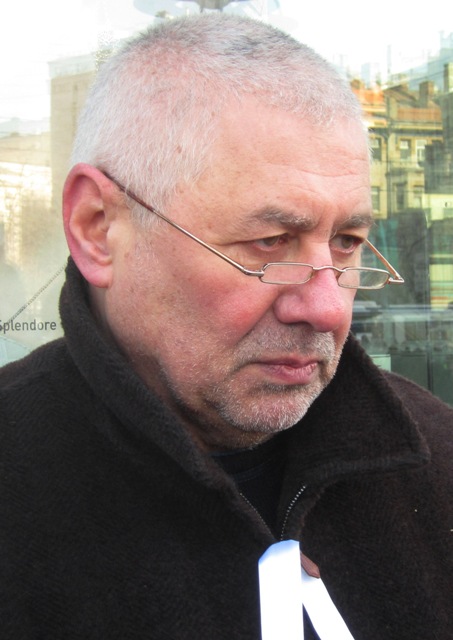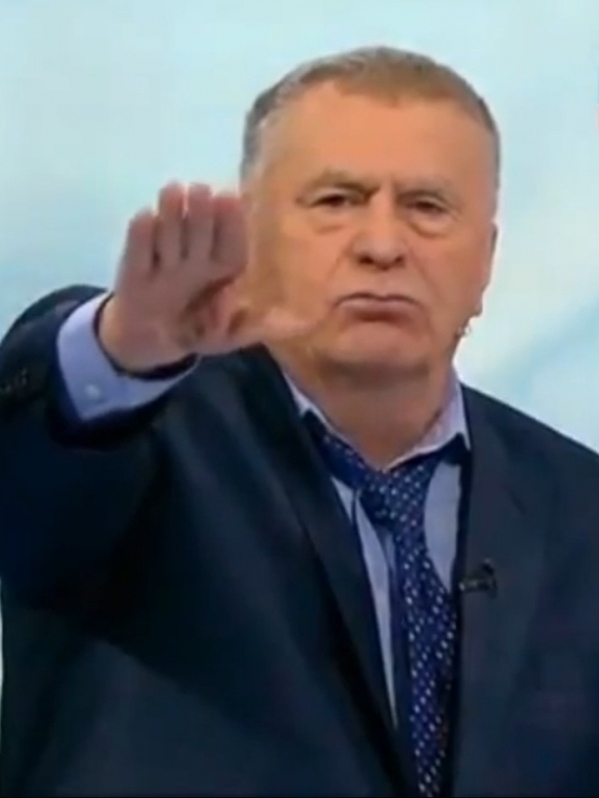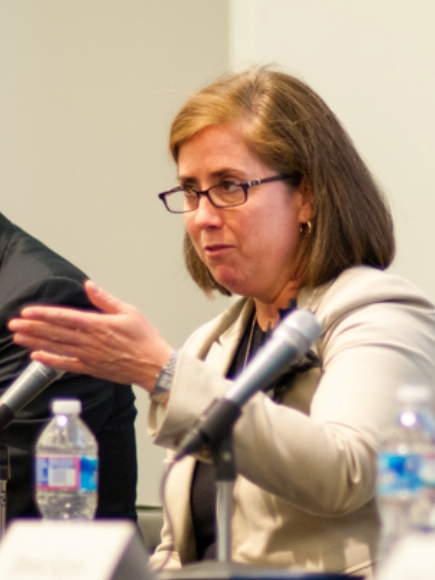Мы продолжаем напряженно работать, чтобы улучшить наш сайт и перевести его на другие языки. Русская версия этой страницы еще не совсем готова. Поэтому мы представляем здесь пока английскую версию. Мы благодарим вас за понимание.
Пропаганда в эпоху Путина
Propaganda in the Putin era
In the time of Mikhail Bulgakov under Ioseb dze Besarionis Dzhugashvili (1878-1953), better known as Joseph Stalin, the propaganda for the regime was omnipresent. The censorship of dissenting voices was almost complete and the repression was extremely severe - offenders risked severe punishment in filthy labour camps, and even immediate execution. Today, under the regime of President Vladimir Vladimirovich Putin (°1952), the propaganda and the censorship are flourishing again in Russia. The principles are the same as in the Stalin era, but the methods used have been adapted to modern times. For example, almost all Russian media are owned by the Kremlin and are often no more than conduits for Kremlin-edited reporting, which means that many Russians do not even know what is really going on in the world. The motivation is reminiscent of the propaganda as it flourished in the time of Mikhail Bulgakov: the monopoly on information provision is in the hands of the Kremlin because it wants to guarantee so-called «mmaximum information security».
Version number 6
In April 2000, the Russian newspaper Kommersant was still a more or less independent outlet. During that period, Veronika Josifina Kutsyllo (°1967), the head of the political editorial staff of the weekend supplement Vlast, got hold of a document entitled Structure of the Presidential Administration in the Russian Federation, which would later become known as Редакция N 6 [Redaktsija No. 6] or Version No. 6, referring to Ward No. 6, a well-known 1892 story by Anton Pavlovich Chekhov (1860-1904) about a lunatic asylum where a constructed reality clashes with real life. The document turned out to be a strategic note circulating in the Kremlin on, among other things, how to deal with the press. Gleb Olegovich Pavlovsky (°1951), an adviser to Vladimir Putin’s administration at the time, could not remember who exactly wrote the memo, but confirmed its existence. The memo stipulated that the Kremlin should follow two tracks: an public policy and a secret policy. It described how leaders should adhere to «a strictly liberal, law-abiding and constitutional approach» in public, but that their policies should also include a secret component that should be used «to maintain and consolidate power».

Глеб Олегович Павловский
Specifically, the document stated that the Kremlin should influence the activities of the media at the federal, regional and local levels by «collecting and using information on the commercial and political activity of all media outlets, personnel and management, sources of financing, financial, economic, material and technical resources.» It also said that information should be collected on the «commercial and political activities of professional journalists, their sources of financing, their place of employment, etc.» According to the authors, the information obtained should be «thrown back into society», but «in the right light». Furthermore, the authors suggested «collecting compromising information on the opposition and the media sympathetic to it", and "putting them in financial difficulties by withdrawing their licenses and certificates and creating conditions under which their activities cannot continue». NTV lost its independence during the period when this note was written. Click on the arrow below to download the text of Version No. 6.
«Russification of the media»
In October 2014, President Putin signed a law that allowed foreign companies to hold a maximum of 20% of Russian media companies. The law will came into force on January 1, 2016. The main justification was, again, «the desire to provide Russians with maximum information security.» «When foreigners own a country’s mass media, they gain access to people’s minds and can shape public opinion,» said Vladimir Volfovich Zhirinovsky (born in 1946), born Vladimir Eidelstein and leader of the LDPR or Liberal Democratic Party. This party was founded by the KGB in 1989. And he continued: «We need to draw a clear line: do these foreigners just want to do business or do they want to impose their opinions and change the situation in the country?»

Владимир Вольфович Жириновский (Эйдельштейн)
The provisional final piece in the expansion of the propaganda machine of modern Russia was the creation of a news agency called Sputnik. In December 2013, President Vladimir Putin issued a decree liquidating the Russian news agency RIA Novosti along with the state-run radio station Голос России [Golos Rossi] or The Voice of Russia and merging them into Спутник [Sputnik]. RIA Novosti controls, among other things, the aforementioned Russia Today (RT), which broadcasts news from Russia around the world in English, German, French, Arabic and Spanish. RT caused a stir, among other things, when it launched a talk show called World Tomorrow on 17 April 2012, hosted by Julian Assange (°1971), the founder of Wikileaks. The first guest was Hassan Nasrallah (°1960), the leader of the Lebanese terrorist organization Hezbollah
In line with this media concentration, the search engine Sputnik was launched in 2014. It functions not only as a classic search engine, but also as an internet portal. The interface is intuitive and only shows the «correct» news. It is set to show the «true picture» of things.
Russia's image abroad
In the run-up to the G8 that Vladimir Putin organised in St. Petersburg in 2006, he hired the American public relations agency Ketchum, a division of the marketing giant Omnicom. Under the leadership of Director Corporate and Public Affairs Kathy Jeavons, Ketchum tried to polish Russia's image abroad. For example, they succeeded in getting Vladimir Putin on the cover of the well-known weekly magazine Time in 2007 as Person of the Year, and in publishing a remarkable opinion piece, A Plea for Caution From Russia, in The New York Times of September 11, 2013. It was written by Vladimir Putin himself, who addressed the Americans directly with this contribution to explain his position in the conflict in Syria and to warn the Americans not to intervene in the conflict in Syria.

Путин на обложке Time
Between 2006 and 2014, Ketchum earned 29.5 million dollar from Russia and another 32 million from the state-owned Gazprom. The latter contract was terminated in 2014. Ketchum also operated the website ModernRussia.com, later renamed ThinkRussia.com. Anyone who relies on this website to keep up with Russian news will be presented with a very peaceful ideal. In March 2014, for example, the headline of this website was not the annexation of Crimea or the deployment of Russian troops on the Ukrainian border, but the opening of a Russian pancake house in New York.

Кэти Джевонс
On March 12, 2015, Ketchum announced that they were no longer able to withstand the «information war» of Western media against Russia, and that they would therefore terminate their contract with the Russian government. The activities would be continued by their European partner GPlus, a company operating from Brussels, Belgium. GPlus also took over the management of ThinkRussia.com, as can be read on the landing page of the website: it contains «Materials disseminated by gplus europe on behalf of the Russian Federation»
However, the Kremlin does not only work with professionals. Just as in the Stalin period, ordinary citizens are used and paid to support the goals of the regime. For example, more and more so-called trolls are being used. These are people who, on behalf of the Russian state, leave positive comments about the work of Vladimir Putin and the Russian government on Facebook, Twitter, various news sites and other platforms on the internet. This happens on Russian sites, but also on international social media, in order to influence English-speaking public opinion.
The trolls are working for the company Агентство интернет Исследований [Agentsvo internet Issledovani] or Internet Research Agency, which initially operated from a building at Primorskoye Shosse 131 in Olgino, St. Petersburg, from which they got their nickname of Olgino trolls. Since then, the agency has changed addresses a few times. You can read more about the trolls' work by clicking the arrow below.
Lies about the war
Shortly after the Russian army invaded Ukraine on February 24, 2022, Roskomnadzor, the Federal Service for Supervision of Communications, Information Technologies and Mass Media, which essentially organises censorship of the Internet, demanded that a number of independent media outlets remove content describing Russia’s war in Ukraine as a «war», an «attack», or an «invasion». These included the newspaper Novaya Gazeta and the television channel Telekanal Dozhd. After all, the Russian government presented the war as a «special military operation» limited to Ukraine’s eastern Donbas region. The bombing of civilian targets in Kyiv, Kharkiv, Kherson, Mariupol, and other major cities was not even mentioned in the state-controlled media.
On March 1, 2022, the Russian Prosecutor General’s Office asked internet watchdog Roskomnadzor to restrict the broadcasts of the radio station Echo of Moscow and Telekanal Dozhd for their coverage of the invasion of Ukraine, claiming that they «deliberately spread false information about the actions of Russian military personnel,” as well as information that “called for extremist activities and violence».
Later that day, Echo of Moscow was taken off the air for the first time since 1991. On March 3, 2022, the board of directors decided to close the station. That same day, Telekanal Dozhd also announced that it was temporarily suspending operations and towards the end of the last broadcast, the crew left the set while the music of Swan Lake by Pyotr Ilyich Tchaikovsky (1840-1893) played in protest. The latter was a reference to the coup d'état of August 1991, when radio and television channels were unable to report the news and instead broadcast footage of the ballet.
